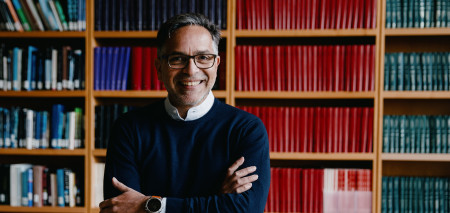Vilcek Foundation Awards $100,000 Prize in Biomedical Science to Alejandro Sánchez Alvarado

NEW YORK, February 22, 2023 (Newswire.com) - For his contributions to the field of regeneration, Alejandro Sánchez Alvarado receives the Vilcek Prize in Biomedical Science. The Vilcek Prize in Biomedical Science is a $100,000 prize awarded annually by the Vilcek Foundation as part of its prizes program.
Awarded annually since 2006, the Vilcek Foundation prizes recognize and celebrate immigrant contributions to scientific research and discovery, and to artistic and cultural advancement in the United States. The prizes provide direct support to individual immigrant scientists and artists and help to raise greater public awareness of the value of immigration for a robust society. In 2023, the Vilcek Foundation awards four prizes in Biomedical Science, comprising the $100,000 Vilcek Prize and three $50,000 prizes—the Vilcek Prizes for Creative Promise in Biomedical Science.
Born in Caracas, Venezuela, molecular and developmental biologist Alejandro Sánchez Alvarado grew up using the scientific method to understand the things that fascinated him in the natural world. As a budding scientist, Sánchez Alvarado moved to the United States to pursue studies in molecular biology at Vanderbilt University in Nashville, Tennessee. Now a leader in the field of regeneration, he is the executive director and chief scientific officer of the Stowers Institute for Medical Research in Kansas City, Missouri.
"Through the combination of rigorous research and new tools and technologies, Alejandro Sánchez Alvarado has worked to illuminate the important functions that epigenetics and signaling have on the process of regeneration," says Vilcek Foundation Chairman and CEO Jan Vilcek. "His work has important implications on the understanding of cellular and organismal regeneration, and holds enormous promise for our further understanding of core biological concepts."
Says Vilcek Foundation President Rick Kinsel, "Research Institutions in the United States have drawn scientists from around the globe, and many groundbreaking discoveries in research and development in biology, physics, and medicine have been by immigrant scientists. The perspective and insight that foreign-born scientists bring to research and development, and the value of diversity in seeking answers to science and medicine's most perplexing questions, cannot be overstated."
Sánchez Alvarado credits being an immigrant and being bilingual as having a profound impact on his work as a scientist, noting how the syntax interpretations of problems or ideas in two different languages—English and Spanish—help him to form more nuanced ideas and hypotheses. "Because every language is an interpretation of the universe, the more interpretations one has access to, the richer our comprehension of the world becomes," he says.
He also reflects on the sacrifices that immigrants make to pursue the subjects and work they are passionate about in the United States. "We left everything behind to pursue an idea," he says. "[We were] not looking for fame or fortune. [We] are looking for answers to questions."
As part of the Vilcek Foundation's prizes campaign, the foundation has published a biographical profile and video highlighting Sánchez Alvarado's life and work on the Vilcek Foundation website, Alejandro Sánchez Alvarado: "Making the improbable possible."
The Vilcek Foundation
The Vilcek Foundation raises awareness of immigrant contributions in the United States and fosters appreciation of the arts and sciences. The foundation was established in 2000 by Jan and Marica Vilcek, immigrants from the former Czechoslovakia. The mission of the foundation was inspired by the couple's respective careers in biomedical science and art history. Since 2000, the foundation has awarded over $7 million in prizes to foreign-born individuals and supported organizations with over $6 million in grants.
The Vilcek Foundation is a private operating foundation, a federally tax-exempt nonprofit organization under IRS Section 501(c)(3). To learn more, please visit vilcek.org.
Source: The Vilcek Foundation
